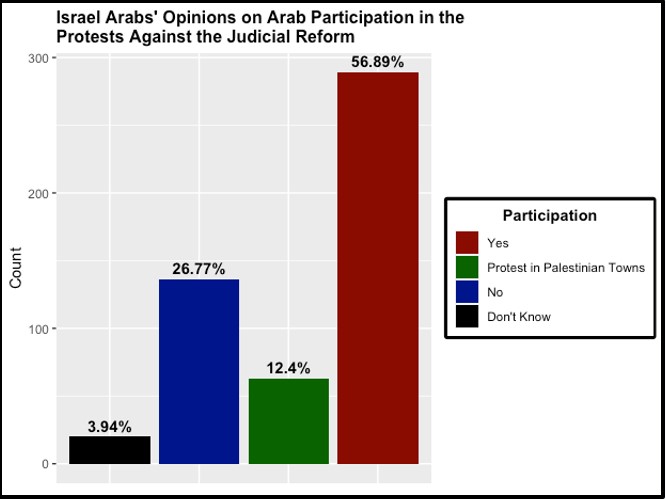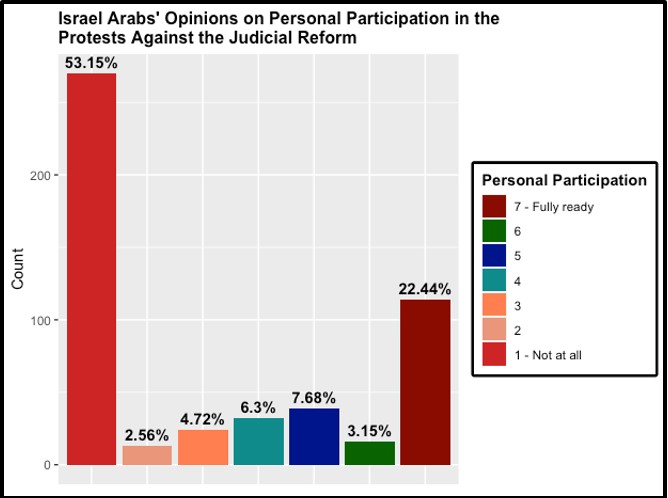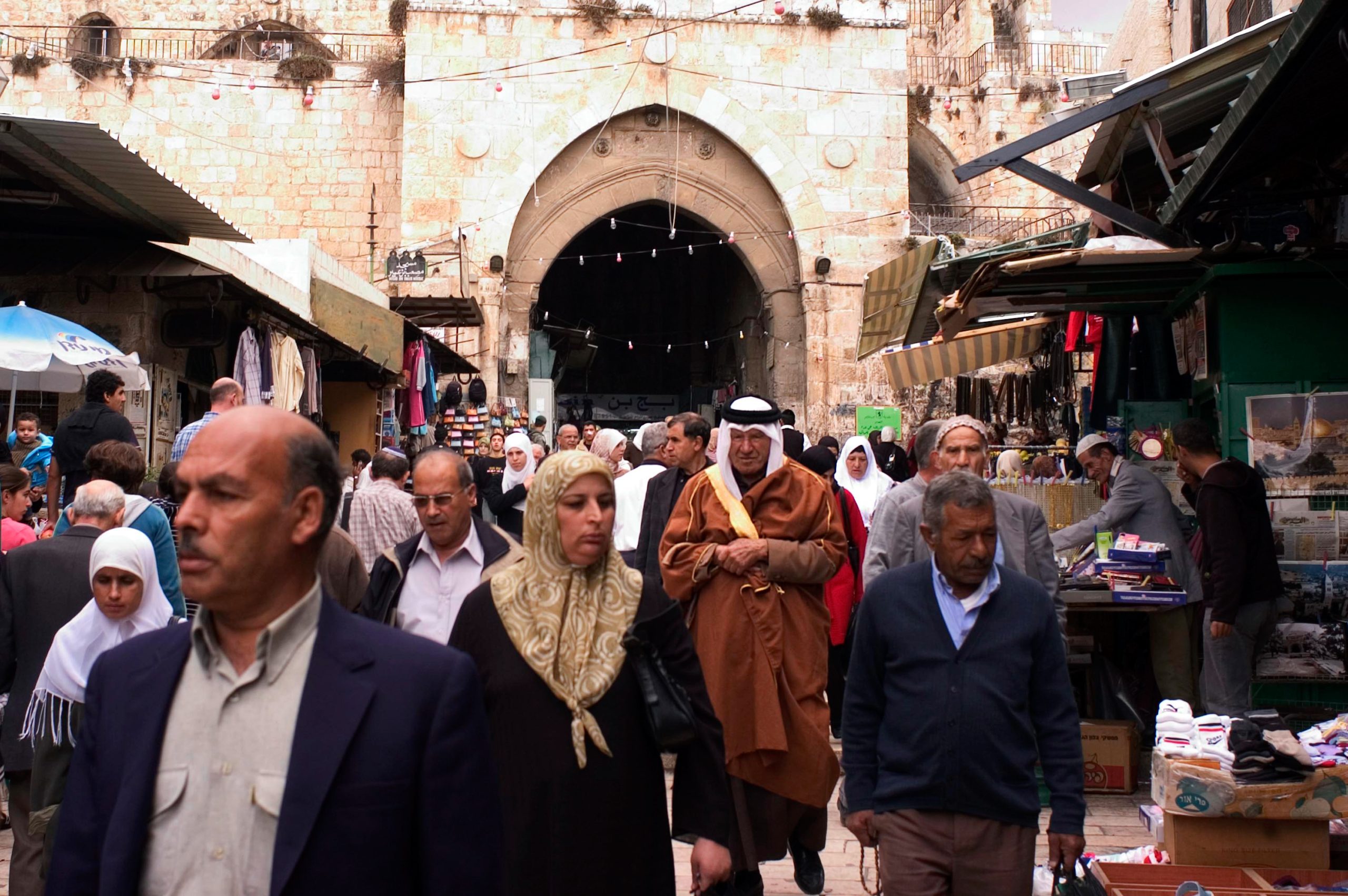Publications
INSS Insight, No. 1746, July 18, 2023
The INSS Insight “Why Don’t Arab Citizens Join the Protest Movement against the Proposed Judicial Overhaul?” attributes the lack of participation by Israeli Arabs in the protests against the judicial overhaul largely to indifference and alienation. The results of a February 2023 survey and a closer analysis, however, reveal a complex interplay of factors that hinder this sector’s involvement. These factors include geographical distance, historical experiences of repression, feelings of alienation, skepticism regarding the inclusivity of democracy, and fears for personal safety. Understanding and addressing these challenges is crucial for fostering greater Arab participation in protests and ensuring their meaningful representation in the pursuit of social and judicial change. Furthermore, efforts toward inclusivity, dialogue, and recognizing the specific concerns of Arab citizens are essential in building a more representative and inclusive democratic system in Israel.
The limited Arab participation in the protests against the proposed judicial overhaul has sparked discussions and analysis, leaving many questioning the reasons behind their seeming indifference or alienation. The April 3, 2023 INSS Insight "Why Don't Arab Citizens Join the Protest Movement against the Proposed Judicial Overhaul?" sheds light on this issue, arguing that Arab neutrality in the protests is counterproductive to their fundamental interests and may even be detrimental to their cause as a significant minority within the country. The article concludes that growing disillusionment with the Israeli government and diminishing trust in the Supreme Court has led some Arab citizens to feel disheartened and to distance themselves from the State of Israel, further exacerbating their reluctance to engage in the protests.
Beyond these valid assessments, a closer examination reveals that Arab citizens indeed harbor genuine concerns and face numerous challenges and reservations that hinder their active involvement in the protests. This article delves deeper into the underlying reasons for what appears to be a clear contradiction: the conspicuous absence of Arab citizens at the protests, taken together with their intense awareness of the importance of representation. Exploring this contradiction can lead to a better understanding of the factors influencing Arab participation in the protests, or the lack thereof.
The results of a late February 2023 public opinion poll conducted by the Haifa-based Palestinian Research Center Mada al-Carmel present perspectives of Arab citizens of Israel about the protests. In particular, the results highlight a divide in the Arab community. Of the respondents, 57 percent expressed support for the involvement of Arab citizens in the protests, reflecting their conviction that Justice Minister Levin’s plan poses a potential risk to the judiciary. On the other hand, 27 percent of respondents opposed Arab participation. Interestingly, the survey also revealed that 12 percent of participants favored the Arab population organizing their protests within their local towns (Figure 1). The widely perceived impact of the Levin plan on the judiciary has instilled a sense of urgency among Arab citizens, as corroborated by the findings of the Mada al-Carmel survey, which indicated that most respondents, at least in theory, support Arab involvement in the protests.

However, the results also suggest that the desire for actual participation on the ground is tempered by reservations and alternative suggestions, e.g., separate protests in Arab towns and villages. The disparity between the recognition of the importance of participating and actual participation is clear in Figure 2, with more than 53 percent of respondents saying that in practice they would not participate.

These attitudes can be attributed to a range of factors. First, the physical distance between protest venues and Arab towns is a significant factor impeding Arab participation. Although Haifa and other northern communities have seen recurring protests, the largest protests occur in Tel Aviv, which is far from the epicenter of the Arab population in Israel in the north of the country. This geographic disparity creates practical challenges for Arab citizens, affecting their ability to participate in these events. Transportation and logistical obstacles pose significant hurdles, making it arduous for them to join the protests and contribute to the cause. Notably, 12 percent of the individuals interviewed wanted Israeli Arabs to organize their protests in Arab towns. Given the challenges of the distance to protests in Tel Aviv, additional protests organized closer to Arab communities would help overcome this issue.
Second, the conspicuous absence of substantial Jewish participation in the Arab protests against social injustice in Israel in 2021 has likely also contributed to Arab citizens of Israel not wanting to join the protests. The sentiment of helplessness among Arab citizens was particularly evident during the outbreaks of major riots in mixed cities like Haifa and Jaffa in 2021, triggered by the Sheikh Jarrah controversy. Despite the gravity of the situation and the active participation of Arab citizens, only a small number of Jewish citizens joined the protests. This limited Jewish involvement further exacerbated the feelings of despair and powerlessness among the Arab population, reinforcing the perception that their struggles were overlooked or ignored. It may be the case, then, that the Arab community's non-involvement may be a way to “pay back” Israeli Jews for their absence at the 2021 protests.
Arab citizens have a pervasive sense of alienation toward the protest environment, fueled by the belief that democracy does not prioritize Arab ethnicity. In the context of the protests, this perception is reinforced by a lack of encouragement for Arab participation from the protests organizers themselves. More broadly, data from the 2022 Israeli Democracy Index reveal an increase from 41 percent in 2017 to 55 percent in 2022 among Arabs citizens of Israel regarding a sense of threats to democratic institutions and norms in the country. Professor Sammy Smooha explains that “Arabs’ civil and national concerns boil down to institutional and social discrimination and exclusion [and they] feel themselves to be second class citizens.” This sense of alienation stems from a perceived disconnect between the democratic ideals proclaimed by the system and the reality experienced by Arab citizens. They may question the extent to which their interests are genuinely considered within the broader democratic fabric of the country.
Finally, personal safety undoubtedly factors into Arab citizens' decision making regarding protest participation. The clashes between the police and the protesters against the judicial overhaul have been well-documented over the past twenty-seven weeks. And there exists a legitimate concern that Arab protesters may encounter more severe treatment from law enforcement compared to their Jewish counterparts. Arab Israelis themselves have expressed as much, expressing fear about using Arabic or “their” slogans, claiming that this would turn them into even more obvious targets for the Israeli police. The fear of potential violence or retribution can lead to Arab Israelis prioritizing personal safety over political expression, dissuading them from actively engaging in the protests.
The factors outlined above contribute to the limited Arab participation in the protests against the proposed judicial overhaul. Addressing these concerns and challenges is essential for fostering greater inclusivity and ensuring that the voices and interests of the Arab community are adequately represented in the pursuit of judicial change, and the social changes that may accompany it. At the same time, Israeli Arabs must recognize that the consensus among those protesting against the judicial overhaul is that settlements and the occupation are not the current focus of their efforts. As such, when making the decision to protest, it is incumbent upon Israeli Arabs to think clearly about two issues: first, what main issues lie at the core of their efforts? And second, how can they most effectively work together with the Jewish protesters and the more progressive elements of Israeli society to achieve these aims?
The limited participation of Arab citizens in the judicial overhaul protests should not be misconstrued as a lack of political awareness or indifference. Instead, it reflects a multifaceted interplay of factors that hinder their active involvement in these events. If Israel does want to be more inclusive and address the lack of Arab representation at the protests, it must adopt an approach of inclusive dialogue, where Arab voices are heard, and their specific issues are addressed. At the same time, in making the decision to protest, Israeli Arabs must clearly define their goals and how they can be achieved within the existing institutions of the state and together with Israeli Jews. By definition, greater involvement of Israeli Arabs in the protests will result in a more inclusive democratic system in Israel. Achieving this goal will necessitate a concerted effort focused on promoting social cohesion and equal access for all, regardless of their ethnic or cultural backgrounds. By making this effort, however, Israel can not only ensure greater Arab representation at the protests, but lay the seeds for a future where the concerns and aspirations of all its citizens are more integrated into the fabric of society.



